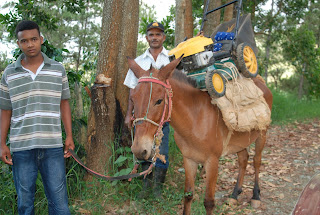
In response to a talk I gave Carra Lee posted a nice blog entry in hopes to inform those back home. Check it out. http://CosmicCowPie.com/
----
Confronting The Coffee Crises:
On our way to Brazil, the largest coffee exporter in the world, we had the opportunity to listen to Lee Gross explain his Masters research on small scale coffee production in the Dominican Republic. We are traveling down the Amazon River on the ML Explorer with the Spring 2011 Semester At Sea voyage learning new concepts from the theme: Thinking Globally to Acting Locally on a daily basis.
Lee Gross sharing research on Spring 2011 Semester At Sea
The information Lee shared was really an awakening for me to really embrace the concept of supporting “Certified Fair Trade” products.
I must admit I have been on the outside looking in with really understanding the importance of using my consumer dollar to support the environment and small scale farming families. Lee’s presentation “connected the dots” for me in understanding why we should buy “Certified Fair Trade” products.
Interesting facts about coffee production:
• 25 million families are “sustained” by coffee and its connected production products
• Shade grown coffee helps with soil conservation, provides habitat for bird life and consumptive fruits to families
• Brazil produces 1/3 of the world’s coffee
• Small production farms would be the size of a backyard in an American subdivision.
• Coffee is handpicked by millions of laborers and grows in remote mountainous areas. The largest cost to bring the coffee to market is the transportation by mule to the cooperative and export overseas
• Coffee is harvested only one time a year which creates a cash flow problem for small farmers
• Coffee is the 2nd most traded commodity in the world behind OIL
• Most small coffee growers receive $1 to $1.40 per pound
• President John F. Kennedy started the ICA International Coffee Agreement regulating coffee prices
• In 1989 the ICA was terminated which has resulted in an extremely volatile coffee market
• It takes 5-7 years from planting a coffee tree to harvest
• Farmers have all the risk with weather, disease and pests
• 63% of the coffee market is controlled by 5 big corporations: ie. Kraft, Proctor & Gamble, Nestles, Tchibo. who in 2001 at the heart of the coffee crisis experienced significant earnings
• Coffee can be differentiated through specialty coffee organizations, which purchase the highest quality coffee i.e. Starbucks, Green Mountain, Cooperative Coffees, Peats Coffee. Coffee can also be differentiated by purchasing single origin coffees
• Fair Trade is a certification, which ensures that farmers are paid a minimum price ($1.38-$1.50) plus a social premium for good practices, democracy in organization and additional premiums for organic production. Coffee by any roaster can be Fair Trade certified
• Certified Fair Trades growers have to produce products under specific condition to obtain the certification
• Many developing countries spend more in military expenses than in the education of their people
• There is no incentive to grow organic so only the consumer can help the farmers by paying more for certified products
• Organic certifications certify the productions method
• Fair Trade certifications certify the process of trade (i.e. labor practices, minimum price, transparency, etc.
• Many farmers do not have title to their land and cannot obtain loans
How can you help make a difference in supporting small farmers? Follow the links below for a cliff note lesson!
1. Read about the Certified Fair Trade products, Specialty Coffees and Relationship Coffees. Don’t buy coffee in a can. Know where it comes from and that workers were paid a fair price. Buy certified and single origin coffees. Be a conscious consumer, your dollar speaks!
2. Be willing to pay more to help the environment and sustainability of the world. Support companies who can ensure transparency in process, social and environmental best practices.
3. Learn more about injustice happening everywhere and share with your friends.
Coffee bean sorting
When I posted information about the class and helping small coffee growers on facebook the first person to comment was my friend Sadie Harris from France. She has been buying Certified Fair Trade products for years and makes a conscious effort to support the movement. Many Europeans are acutely aware of how this impacts the world. Traveling around the world, learning from educators in all fields of sustainability is certainly helping me connect more dots! We are taking the global lessons and applying them to our local practices!
One person DOES make a difference and if that person shares with one other person who becomes aware of the environment and injustice then modifies their buying behavior the world can change. Remember to Buy Certified Fair Trade Products!
I am excited to hear back from you! Read all the links and then let us know how it touched your life and what you are doing to share?
This post took days to finish with the bad Internet connection so thank you for your patience! More to come Connecting The Dots Around The World! Be sure to check out the contest to visit one of the seven wonders of the world!









